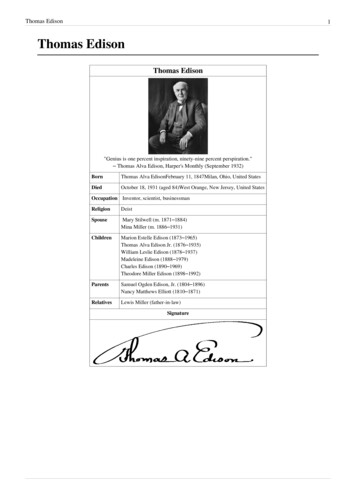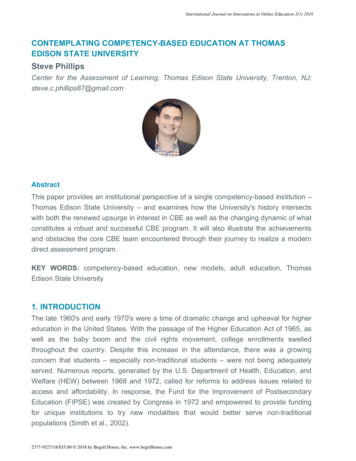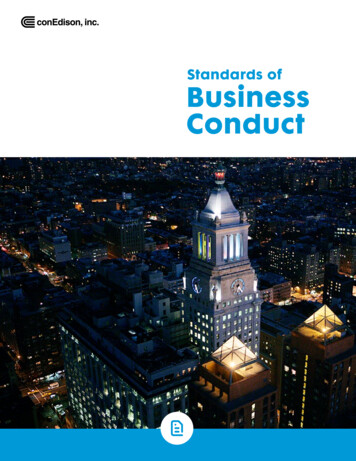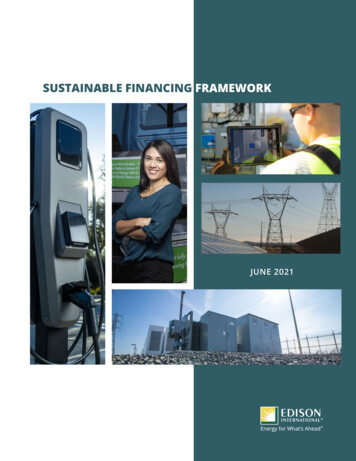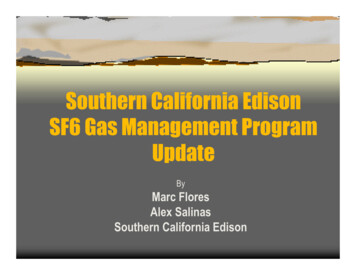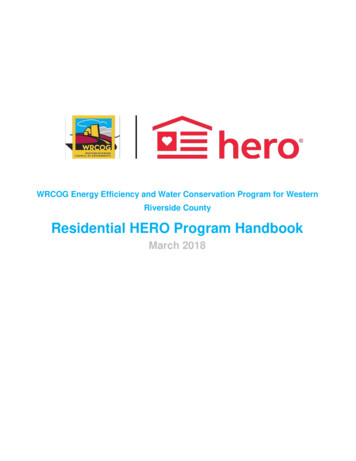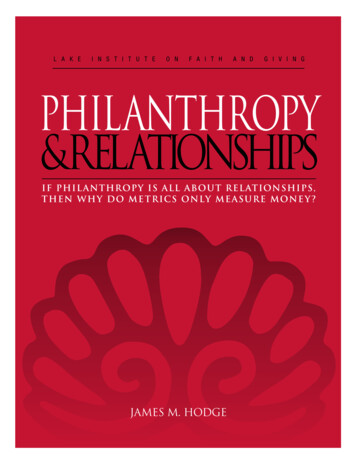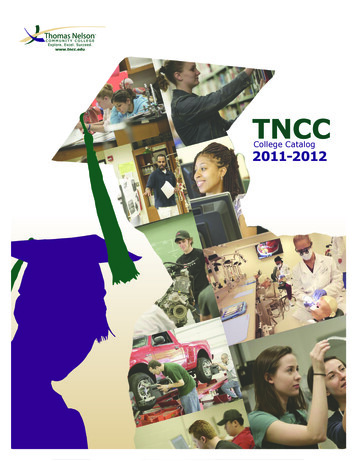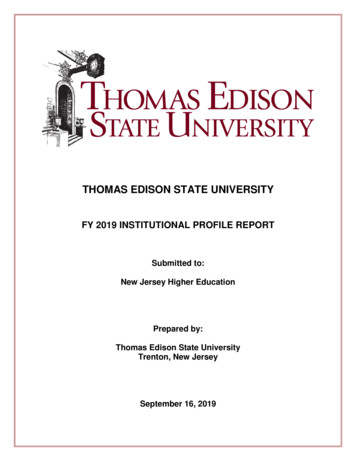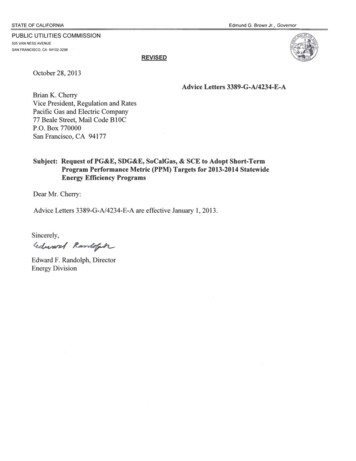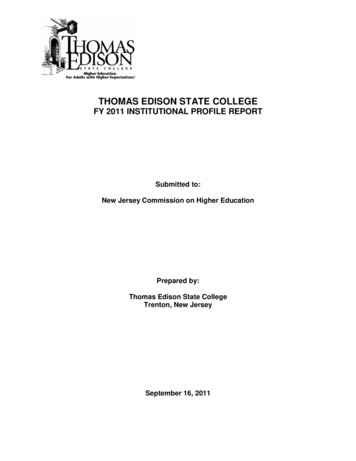
Transcription
THOMAS EDISON STATE COLLEGEFY 2011 INSTITUTIONAL PROFILE REPORTSubmitted to:New Jersey Commission on Higher EducationPrepared by:Thomas Edison State CollegeTrenton, New JerseySeptember 16, 2011
Thomas Edison State CollegeTABLE OF CONTENTSINSTITUTIONAL PROFILE SUMMARY. . . . . . . . . . . . . . . . . . . . . . .iTHOMAS EDISON STATE COLLEGE MISSION & PURPOSE . . . .iiA. ACCREDITATION STATUS. . . . . . . . . . . . . . . . . . . . . . . . . . . . . .11. Institutional accreditation . . . . . . . . . . . . . . . . . . . . . . . . . . . .2. Professional accreditation . . . . . . . . . . . . . . . . . . . . . . . . . . . .11B. NUMBER OF STUDENTS SERVED. . . . . . . . . . . . . . . . . . . . . . .1. Number of undergraduates by attendance status . . . . . . . . . . . . . .2. Number of graduate students by attendance status. . . . . . . . . . . .3. Number of noncredit students served. . . . . . . . . . . . . . . . . . . . .4. Unduplicated count of students enrolled during the year. . . . . . . .22222C. CHARACTERISTICS OF UNDERGRADUATE STUDENTS . . . . . 31. Mean math, reading, and writing SAT scores. . . . . . . . . . . . . . . .2. Enrollment in remediation courses by subject area. . . . . . . . . . . .3. Race/ethnicity, gender, and age (separately). . . . . . . . . . . . . . . . .4. Numbers of students receiving financial assistance under eachfederal-, state- & institution-funded aid program. . . . . . . . . . . . .5. Percentage of students who are New Jersey residents . . . . . . . . . .333D. STUDENT OUTCOMES . . . . . . . . . . . . . . . . . . . . . . . . . . . . . . . . . . .61. Graduation rates by race/ethnicity category (Four-, five- and sixyear graduation rate) . . . . . . . . . . . . . . . . . . . . . . . . . . . . . .2. Third-semester retention rates (by attendance status). . . . . . . . . .3. Time-to-degree completion . . . . . . . . . . . . . . . . . . . . . . . . . . . . . .4. Student Learning Outcomes . . . . . . . . . . . . . . . . . . . . . . . . . . . . .6666E. MENTOR CHARACTERISTICS . . . . . . . . . . . . . . . . . . . . . . . . . .91. Full-time faculty by race/ethnicity, gender, academic rank andtenure status (simultaneously) . . . . . . . . . . . . . . . . . . . . . . . . . . .2. Percentage of course sections taught by full-time faculty . . . . . .3. Ratio of full- to part-time faculty . . . . . . . . . . . . . . . . . . . . . . . . .4. Mentor characteristics: race/ethnicity and gender . . . . . . . . . . . .999945
Thomas Edison State CollegeF. CHARACTERISTICS OF THE TRUSTEES . . . . . . . . . . . . . . . . . . .101. Race/ethnicity and gender (simultaneously). . . . . . . . . . . . . . . . . 102. List of trustees/governors with titles and affiliations . . . . . . . . . . . 103. URL Information . . . . . . . . . . . . . . . . . . . . . . . . . . . . . . . . . . . . . 10G. A PROFILE OF THE INSTITUTION . . . . . . . . . . . . . . . . . . . . . . . . .111. Degree and certificate programs . . . . . . . . . . . . . . . . . . . . . . . . . .2. Other . . . . . . . . . . . . . . . . . . . . . . . . . . . . . . . . . . . . . . . . . . . . . .1112H. MAJOR RESEARCH AND PUBLIC SERVICE ACTIVITIES . . . . .14I. MAJOR CAPITAL PROJECTS UNDERWAY IN FISCAL 2010 . . .15III. OTHER INSTITUTIONAL INFORMATION . . . . . . . . . . . . . . . . . . .16
Thomas Edison State Collegei
Thomas Edison State CollegeThomas Edison State CollegeMission & PurposeMissionThomas Edison State College provides flexible, high-quality, collegiate learning opportunitiesfor self-directed adults.PurposeThomas Edison State College was established by the State of New Jersey and chartered by theNew Jersey Board of Higher Education in 1972. The College was founded for the purpose ofproviding diverse and alternative methods of achieving a collegiate education of the highestquality for mature adults. To this end, the College seeks:I.To provide curricula and degree opportunities of appropriate level and compositionconsistent with the aspirations of our students, the public welfare, and the highestqualitative standards of American higher education.II.To create a system of college-level learning opportunities for adults by organizingcollegiate and sponsored non-collegiate instruction into coherent degree strategies.III.To make available educationally valid learning opportunities which serve as alternativesto college classroom study and which are appropriate to the varied needs and learningstyles of adults.IV.To develop and implement processes for the valid and reliable assessment of experientialand extra-collegiate college-level learning, and to provide appropriate academicrecognition for knowledge so identified consistent with high standards of quality andrigor.V.To serve higher education and the public interest as a center of innovation, information,policy formulation and advocacy on behalf of adult learners.VI.To fulfill the public service obligation inherent to American institutions of highereducation.VII.To conduct its affairs in a manner which acknowledges the maturity, autonomy, anddignity of its students; assures a portal of access to higher education for adult learners;and celebrates the values, diversity and high qualitative standards of American highereducation.ii
Thomas Edison State CollegeA. ACCREDITATION STATUS1. Institutional accreditation. Thomas Edison State College is accredited by the Middle StatesAssociation of Colleges and Schools, the accrediting body for colleges and universities in themiddle states region. This accreditation is part of a national system of quality assurance thatrequires colleges and universities to reach a common understanding and agreement as to thestandards of quality for American higher education. After a comprehensive institutional selfstudy and a site visit by the Middle States Evaluation Team in April 2002, the College wasreaccredited through 2012.The Periodic Review Report (PRR) was submitted to Middle States Association of Collegesand Schools in June 2007; this report documents the College’s work during the five yearperiod from 2002 through 2007. The report was approved by the Middle States Commissionof Colleges and Schools in November 2007; thus reaffirming the College’s institutionalaccreditation through 2012.The College is undergoing a Self-Study in preparation for its next Middle States Associationof Colleges and Schools accreditation review. The visit will take place in March 2012.2. Professional accreditation. The W. Carey Edwards School of Nursing RN-BSN program isaccredited by the New Jersey Board of Nursing and the National League for NursingAccrediting Commission (NLNAC). The program was reaccredited by the National Leaguefor Nursing through 2011. The W. Carey Edwards School of Nursing RN/BSN-MSNprogram is accredited by the Commission on Collegiate Nursing Education (CCNE). Theprogram was accredited through 2014.Thomas Edison State College’s Master of Arts in Educational Leadership Program, which isdesigned to prepare educators for roles in school leadership, was granted Initial Accreditationby the Teacher Education Accreditation Council (TEAC) for a period of five years, fromDec. 11, 2009, to Dec. 11, 2014. This accreditation certifies that the forenamed professionaleducation program has provided evidence that the program adheres to TEAC’s qualityprinciples.1
Thomas Edison State CollegeB. NUMBER OF STUDENTS SERVED1. Number of undergraduates by attendance statusThomas Edison State CollegeTable II.B.1:Undergraduate Enrollment by Attendance Status, Fall tal17,721100%Source: IPEDS Fall Enrollment Survey2. Number of graduate students by attendance statusThomas Edison State CollegeTable II.B.2:Graduate Enrollment by Attendance Status, Fall 0%1,015100%Source: IPEDS Fall Enrollment Survey3. Number of noncredit students served. There were 154 students who took noncreditcourses through the John S. Watson School of Public Service and Continuing Studies.4. Unduplicated count of students enrolled during the year. During FY 2010, there were18,736 students enrolled at the College.2
Thomas Edison State CollegeC. CHARACTERISTICS OF UNDERGRADUATE STUDENTS1. Mean math, reading, and writing SAT scores. This section is not applicable to ThomasEdison State College.2. Enrollment in remediation courses by subject area. This section is not applicable toThomas Edison State College.3. Race/ethnicity, gender, and age (separately). Profiles of the undergraduate students byrace/ethnicity, gender, and age are presented in the tables below.Thomas Edison State CollegeTable II.C.3.aUndergraduate Enrollment by Race/Ethnicity, Fall eBlackHispanicAsian*American IndianAlienRace .7%3.6%0.8%1.4%9.0%100.0%* Note: Asian includes Pacific Islanders and Unknown includes 2 or More Races.Source: IPEDS Fall Enrollment SurveyThomas Edison State CollegeTable II.C.3.b:Undergraduate Enrollment by Gender, Fall ---Part-timeN%10,74560.6%6,97617,721Source: IPEDS Fall Enrollment 21100.0%
Thomas Edison State CollegeThomas Edison State CollegeTable II.C.3.cUndergraduate Enrollment by Age, Fall 2010AgeLT 1818-1920-2122-2425-2930-3435-3940-4950-6465 81,566424317,721Source: IPEDS Fall Enrollment Survey4. Number of students receiving financial assistance under each federal-, state-, andinstitution-funded aid program. The number of students receiving financial assistance ispresented in the table below.Thomas Edison State CollegeTable II.C.4:Financial Aid from Federal, State & Institution-Funded Programs, AY 2009-10FEDERAL PROGRAMSPell GrantsCollege Work StudyPerkins LoansSEOGPLUS LoansStafford Loans (Subsidized)Stafford Loans (Unsubsidized)SMART & ACG or otherSTATE PROGRAMSTuition Aid Grants (TAG)Educational Opportunity Fund (EOF)Outstanding Scholars (OSRP)Distinguished ScholarsUrban ScholarsNJ STARSNJCLASS LoansINSTITUTIONAL PROGRAMSGrants/ScholarshipsLoansRecipientsDollars( 02213,0005135,00026,000 1,000.002,000.00-Source: NJIPEDS Form #41 Student Financial Aid Report4
Thomas Edison State College5. Percentage of students who are New Jersey Residents. Due to the growing number ofactive military students enrolled, the College examines residence by military status. As thetable below indicates, among nonmilitary students, 59 percent of the enrolled students wereNew Jersey residents. Seven percent of the military students were also N.J. residents.Thomas Edison State CollegeTable II.C.5:Enrollment by Military Status and ResidenceResidenceNew JerseyOut of 9.2%3,94539.4%490.5%920.9%10,019100.0%Active %Source: Thomas Edison State College, FY 2010 President’s Annual Report to the Board of Trustees5
Thomas Edison State CollegeD. STUDENT OUTCOMES1. Graduation rates:a. Four-, five-, and six-year graduation rate by race/ethnicity (senior publics). Thissection is not applicable to Thomas Edison State College.b. Two-year graduation rate (community colleges). This section is not applicable toThomas Edison State College.c. Three-year graduation and transfer rate by race/ethnicity (community colleges).This section is not applicable to Thomas Edison State College.2. Third-semester retention rates (by attendance status). This section is not applicable toThomas Edison State College.3. Time-to-Degree Completion. Since Thomas Edison State College enrolls primarily adultstudents who often bring in credit upon enrollment, the College monitors time-to-degreecompletion to examine how long it takes graduates to earn a degree from the College. Aspresented in Table D:3a below, during FY 2011, the associate degree graduates took 3.0years to graduate, the bachelor’s degree graduates took 3.5 years to graduate and the master’sdegree graduates took 2.8 years to graduate.Thomas Edison State CollegeTable D: 3a:FY 2011 Graduates Time-to-Degree Completion by Degree 2.8Source: Thomas Edison State College, FY 2011 President’s Annual Report to the Board of TrusteesThe College also monitors time-to-degree completion by examining differences between instate and out-of-state students. The time-to-degree completion for in-state versus out-of-statestudents is presented below.Thomas Edison State CollegeTable D: 3b:FY 2011 Graduates Time-to-Degree Completion by Degree Level and ResidenceNJ ResidentsOut-of-State ��s2.82.7Source: Thomas Edison State College, FY 2011 President’s Annual Report to the Board of Trustees4. Student Learning Outcomes. Thomas Edison State College has established learningoutcomes at the undergraduate and graduate level. These institutional outcomes identify areasin which students should be competent upon graduation from the College.6
Thomas Edison State CollegeInstitutional Undergraduate Learning OutcomesAll Thomas Edison State College students who graduate from bachelor’s degree programs willhave the following competencies.Information Literacy:Graduates will recognize when information is needed, be able to identify, and to locate,evaluate and use effectively and appropriately the information found.Technological Competency:Graduates will solve problems and perform tasks using appropriate technological tools.Responsible Ethical Leadership:Graduates will articulate in their own words the ethical principles they have discovered andencountered in their academic discipline or profession. Graduates will recognize andarticulate actual ethical dilemmas witnessed or experienced.Scientific Reasoning:Graduates will analyze issues and problems by applying scientific methods.Diversity/Global Literacy:Graduates will demonstrate an understanding of globally diverse perspectives, cultures,values, events, trends and issues.Quantitative Reasoning/Literacy:Graduates will be quantitatively literate. They will apply mathematical concepts and skills toinform personal and professional decision making.Communication:Graduates will communicate with proficiency.Critical Analysis and Reasoning:Graduates will demonstrate critical-thinking and problem-solving skills and analyze content,discover meaning or significance, draw conclusions and make assessments.Lifelong Learning:Graduates will demonstrate a commitment to lifelong learning.Institutional Graduate Learning OutcomesAll Thomas Edison State College students who graduate from advanced-level degree programswill be able to:Demonstrate mastery of in-depth knowledge of the current major questions, debates andmethodologies in their field or profession;7
Thomas Edison State CollegeUse critical thinking, reflective, and research skills to evaluate theory to make informeddecisions and improve practice in their field;Communicate in a variety of formats appropriate to the field of study;Apply ethical decision making in research, evaluation, organizational culture andcommunities;Integrate and use effectively technology in evaluating information and its sources in practicalapplication in field of study; and,Recognize cultural influences in organization and community decision making.Programmatic learning outcomesProgrammatic learning outcomes, focusing on degree specific learning goals and objectives,have also been established within each school at the undergraduate and graduate degree levels.Assessment MeasuresDirect as well as indirect assessment measures are used to assess student learning outcomes.8
Thomas Edison State CollegeE. MENTOR CHARACTERISTICS1. Full-time faculty by race/ethnicity, gender, academic rank and tenure status(simultaneously). This section is not applicable to Thomas Edison State College.2. Percentage of course sections taught by full-time faculty. This section is not applicableto Thomas Edison State College.3. Ratio of full- to part-time faculty. This section is not applicable to Thomas Edison StateCollege.4. Mentor characteristics: race/ethnicity and gender. Thomas Edison State College signsletters-of-agreement with subject-matter experts. These mentors and consultants engage withthe academic units of the College in various ways: development and/or assessment in testconstruction, portfolio assessment, facilitating courses (e.g., Guided Study and online), pregraduation conferences, demonstration of currency, practicum, nursing performanceexaminations, and program evaluations. During FY 2011, there were 672 mentors. Thegender and race/ethnicity of the mentors are presented n, Not LatinoHispanic Or LatinoNative AmericanOtherUnknown/Not l7023498158652331319672Source: Thomas Edison State College, FY 2011 President’s Annual Report to the Board of Trustees9
Thomas Edison State CollegeF. CHARACTERISTICS OF THE TRUSTEESThe Board of Trustees is the premier governing body of the College. The members areappointed by the governor with the advice and consent of the Senate. Members of the Boardbring with them diverse experiences and varied backgrounds from business, industry, andacademia. The Board oversees all policy matters of the College, including the approval ofdegree programs and standards, budget recommendations to the governor, and appointmentsof all College employees. There are two student members on the Board: one a voting memberand the other an alternate.1. Race/Ethnicity and Gender (simultaneously). A profile of the Board of Trustees byrace/ethnicity and gender is presented in the table below.Thomas Edison State CollegeTable F. 1Race/Ethnicity and Gender of the Board of Trustees, FY 2012Race/EthnicityWhiteBlackHispanicAsianAmerican IndianRace UnknownTotalGenderMaleFemale3216Total224541102. Board of Trustee Members. The current Board of Trustee members are presented inthe table below.Thomas Edison State CollegeTable F.2Board of Trustees, FY 2012NameRev. J. Stanley JusticeEric R. LearDr. Fred AbbateRichard ArndtIda HammondGualberto MedinaE. Harvey MyersMarilyn PearsonStacy SlomkoDebra SchmelzerDr George A. Pruitt (Ex-officio)TitleAffiliationPastorManaging PartnerRetiredRetiredRetiredExecutive Managing DirectorArchitectPhilanthropic Consultant, VPTeacherParaprofessionalPresidentMt. Zion AME ChurchLear & Pannepacker, LLPNew Jersey Utilities AssociationAmerican Cancer SocietyNew Jersey Department. of EducationCushman & WakefieldE. Harvey Myers ArchitectFirst Citizens BankPerth Amboy High SchoolWithum, Smith & BrownThomas Edison State College3. URL Information. For information about the Thomas Edison State College Board ofDirectors, please go to: http://www.tesc.edu/564.php.10
Thomas Edison State CollegeG. . A PROFILE OF THE INSTITUTION1. Degree and Certificate ProgramsUndergraduate Degree Programs and Certificates. Thomas Edison State Collegeoffers six associate degrees and 10 bachelor’s degrees (including three joint degreeprograms with the University of Medicine and Dentistry of New Jersey). There areapproximately 100 areas of study in the undergraduate degree programs.The Associate Degree Programs are as follows: Associate in Applied Science, Associatein Arts, Associate in Science in Applied Science and Technology, Associate in Science inBusiness Administration, Associate in Science in Natural Sciences and Mathematics, andAssociate in Arts in Human Services (formerly known as Associate in Science in Publicand Social Services).The Bachelor’s Degree Programs include: Bachelor of Arts, Bachelor of Science,Bachelor of Science in Applied Science and Technology, Bachelor of Science in BusinessAdministration, Bachelor of Science in Health Sciences (a joint degree with the Universityof Medicine and Dentistry of New Jersey), Bachelor of Science in Health InformationManagement (a joint degree with the University of Medicine and Dentistry of NewJersey), Bachelor of Science in Human Services, Bachelor of Science in Nursing (BSN),Bachelor of Science in Medical Imaging Sciences (a joint degree with the University ofMedicine and Dentistry of New Jersey), and Bachelor of Science in OrganizationalLeadership.The College offers two types of Bachelor of Science in Nursing programs, a RN toBSN/MSN program and an Accelerated 2nd Degree BSN program. The RN to BSN/MSNprogram provides a seamless transition for students enrolled in the Bachelor of Science inNursing degree who want to earn a Master of Science in Nursing degree. The Accelerated2nd Degree BSN program is an intensive one year program for adults who already possessa non-nursing bachelor’s degree and are interested in becoming a registered nurse; thisnew degree program will begin in the Fall 2011.The College also awards Certificates in the following professional areas: Accounting,Computer Aided Design, Computer Information Systems, Computer Science, DentalAssistant (with the University of Medicine and Dentistry of New Jersey), Electronics,Finance, Fitness and Wellness Services, Gas Distribution, Human ResourcesManagement, Labor Studies, Marketing, Operations Management, Polysomnography, andPublic Administration.Master’s Degree Programs and Certificates. The College currently offers six master’sdegree programs: Master of Arts in Educational Leadership, Master of Arts in LiberalStudies (formally known as the Master of Arts in Professional Studies), Master of Sciencein Human Resources Management, Master of Science in Management, Master of Sciencein Applied Science and Technology, and Master of Science in Nursing (MSN). Graduatesof the MSN degree program earn a Nursing Administration, Nurse Educator, or Nursing11
Thomas Edison State CollegeInformatics certificate, in addition to the MSN degree, depending on the area of study theyselect.There are also several graduate Certificate programs offered: Clinical Trials Management,Homeland Security, Human Resources Management, Online Learning and Teaching,Organizational Leadership, Project Management, Public Service Leadership (open only tograduates of the Executive Potential Program offered by the Center for GovernmentTraining and Professional Development’s Graduate School), Nursing Administration,Nurse Educator, and Nursing Informatics. The College also offers a post master’scertificate in Educational Leadership.More information about the degree programs offered by the College and the majors/areasof study offered is available on the College website, http://www.tesc.edu.2. OtherAffiliation with New Jersey State Library. Legislation codifying in statute the affiliationof the New Jersey State Library with Thomas Edison State College was signed by thegovernor in FY 2001. This affiliation and other collaborative projects have made asignificant positive difference to the New Jersey State Library and the other libraries withwhich it is connected.National Institute on the Assessment of Adult Learning. The National Institute on theAssessment of Adult Learning is sponsored annually by Thomas Edison State College. Themain goals of the National Institute are to address issues related to assessment and adultlearning. This year’s institute, themed Virtual Assessment—Real Outcomes, addressed theemerging issue of how to harness technology to better serve nontraditional students.Innovation Award for Development of Flash-Based Courses. The National UniversityTechnology Network (NUTN) selected Thomas Edison State College to receive its 2011Distance Education Innovation Award for the development of the FlashTrack coursedelivery system, which delivers entire courses to students via a flash drive and does notrequire a constant Internet connection.Graduates Have Highest Pass Rates of CPA Exam. According to the NationalAssociation of State Boards of Accountancy’s 2010 candidate performance report, ThomasEdison State College graduates have the highest pass rates for the Uniform Certified PublicAccountant (CPA) Examination among all regionally accredited senior institutions of highereducation in New Jersey that offer accounting programs. According to the report, 61.5percent of Thomas Edison State College graduates who took the Uniform CPA Examinationin the calendar year 2009 passed the exam.New Noncredit Certificates and Courses. Thomas Edison State College launched severalnew online noncredit certificates and courses focusing on family and school nutrition, andnonprofit management that are built around the unique needs of adult learners. Newprofessional certificates are now offered in Family Nutrition, Functional Family Nutrition,12
Thomas Edison State Collegeand School Nutrition and Wellness. Noncredit course offerings now include NonprofitAccounting and Grantsmanship for Nonprofits.13
Thomas Edison State CollegeH. MAJOR RESEARCH AND PUBLIC SERVICE ACTIVITIESThomas Edison State College engages in public service activities through individual staffparticipation on various external boards, committees, and organizations, militarypartnerships, The John S. Watson Institute for Public Policy, and the Office of CommunityAffairs & Government Relations. In addition, the State Library, an affiliate of ThomasEdison State College, contributes to the public service activities of the College (see “Other”section below). Highlights of some of the College’s activities are provided below.The John S. Watson Institute for Public PolicyThe John S. Watson Institute for Public Policy advocates for public policy changes andassists decision makers to enact public policy that best serves the residents of New Jersey.The Institute practices a practical, hands-on approach to support and inform the people andlegislators of the State. There are six centers within the Institute: Center for UrbanEnvironment, Center for Civic Engagement and Leadership Development, Center for thePositive Development of Urban Children, Center for Health Policy Development, TechnicalAssistance and Support Service Center, and the Education Policy and Practice Initiative. TheInstitute also serves the New Jersey Urban Mayor’s Association through conferences,meetings, training sessions, and policy review and analysis.Highlights from this year include advocacy on issues related to climate change, clean air,clean water, and clean neighborhoods, working with Big Brothers/Big Sisters and theTrenton High School Mentoring Program, and collaborating with several statewideorganizations on an initiative to reduce childhood obesity. Institute staff also reviewed andassessed state policy on Urban Enterprise Zones, affordable housing, school reform, Board ofPublic Utility regulations, and land use.For more information about the John S. Watson Institute for Public Policy and its centers,please go to: http://www.tesc.edu/3553.php.Revitalizing Downtown TrentonThe College, though staff in the Office of Community Affairs & Government Relations,serves as the lead facilitator of Capital City Partnership, a registered 501c3 organization setup to broker, foster, and leverage private, public, and community resources to enhance andpromote redevelopment initiatives that will revitalize the Canal Banks area of Trenton, N.J.The Partnership involves the College, Shiloh Baptist Church, The New Jersey StateChamber of Commerce, Capital Health System, and other members of local business andresidential groups. During FY 2011, the Partnership implemented a street-light improvementproject, identified parking solutions, and received a grant for a beautification project.14
Thomas Edison State CollegeI. MAJOR CAPITAL PROJECTS UNDERWAY IN FY 2011The College was involved in several technology initiatives this year. The initiatives includeddevelopment of a formal Disaster Recovery and Business Continuity Plan and various systemupgrades.The Academic Center was equipped with a new heating, ventilation, and air conditioning systemto ensure maximum energy efficiency. The process of restoring the Kuser Mansion has begun; anarchitect firm has been selected and employees have been relocated to other College buildingsfor the duration of the restoration project.15
Thomas Edison State CollegeIII. OTHERNew Jersey State Library Selected HighlightsNJ State Library Grant. In July 2010, Thomas Edison State College was awarded a 5.1million federal grant to support the New Jersey State Library’s Broadband TechnologyOpportunity Program, a project designed to add computer workstations, upgrade Internetconnectivity and provide job search assistance and workforce development programs at hundredsof libraries throughout New Jersey. The grant was provided by the National Telecommunicationsand Information Administration as part of the American Recovery and Reinvestment Act’sBroadband Technology Opportunity Program. The award, along with a 1.5 million grant fromthe Bill & Melinda Gates Foundation, is being used to add computers at 124 libraries, upgradeconnectivity at 79 libraries, and provide job search assistance, employment skills, workforcedevelopment programs and other online resources at 365 libraries across New Jersey. In addition,the Bill & Melinda Gates Foundation gave an additional 1.5 million to the New Jersey StateLibrary to support E-rate technical assistance, which will help sustain the project’s services.Renovation of Four Public Libraries. The SWAT Team, a brainchild of the State Librarian’sBlue Ribbon Task Force on the Future of Libra
Thomas Edison State College provides flexible, high-quality, collegiate learning opportunities for self-directed adults. . Professional accreditation. The W. Carey Edwards School of Nursing RN-BSN program is accredited by the New Jersey Board of Nursing and the National League for Nursing Accrediting Commission (NLNAC). The program was .
